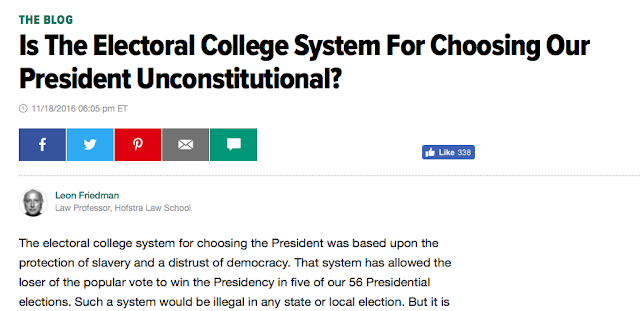Saturday, November 19, 2016
Huffington Post: Is the Electoral College unconstitutional?
The Huffington Post is asking its readers if the Electoral College is unconstitutional.
From the Huffington Post:
The electoral college system for choosing the President was based upon the protection of slavery and a distrust of democracy. That system has allowed the loser of the popular vote to win the Presidency in five of our 56 Presidential elections. Such a system would be illegal in any state or local election. But it is contained in the Constitution. Can a section of the Constitution itself be unconstitutional? The answer is yes.
We are all aware by now that we do not vote directly for a candidate in a Presidential election. We vote for electors who will (presumably) vote for the candidate who won the popular vote in the state, when the college meets after the election. Under Article II, Sect. 2 of the Constitution (later modified by the Twelfth Amendment), the number of electors is determined by combining the number of members of the House of Representatives in each state and its two Senators.
Read more......
Arguments that we should move to a popular election from the electoral college is just disgruntled "Hail Mary" nonsense. This is the sixth time the winner didn't take the popular vote. And so what?
The electoral college was devised for very good reasons, well documented elsewhere.
Nixon won by the greatest percentage of the popular vote ever in 1972. I think you can say that the popular vote isn't necessarily a good barometer of anything.
The complaints against the electoral college remind me of old-time Cubs losing streaks when Harry Caray, desperate to find a positive, would say, "Well, folks, there is good news! Sales of hot dogs and beer at Wrigley Field are at a record high!" as if that was a substitute for winning the game on the field.
The electoral college eliminates the mischief that minor, single-issue parties cause. If the election had been by popular vote, the Republican Establishment, which favored Hillary Clinton, might have done an end-run around Donald Trump by nominating its own candidate. We would have had:
Donald Trump - Republican 33%
John Kasich - True Blue Republican 12%
Hillary Clinton 33%
Bernie Sanders (write-in Progressive) 8%
Libertarian Johnson 6%
Green Party (whoever) 4%
Other parties 4%
We'd probably end up with a run-off election with coalition building between the major and minor parties. That is what makes European governments so unstable. We don't need it.
The real reason we have an Electoral College is largely the same reason we have a U.S. Senate organized as it is: to protect the relevancy of our smaller states in our governance. Otherwise, the weight of our larger states would render them meaningless as crucibles of diverse American culture.
Without both institutions we never would have kept a nation when our representatives gathered to surprise state sponsors and write a new constitution; or at least no nation that even vaguely resembles the one we built over 228 years under the constitution that resulted.
Eliminating the Electoral College would require a constitutional amendment or a constitutional convention (new constitution). For either to happen, those smaller states would need to effectively commit suicide. This is never going to happen, our political organization is a settled matter, and Democratic sore losers can go fish – and focus instead on how to save their party.
Do you understand what the Electoral College is? Or how it works? Or why America uses it to elect its presidents instead of just using a straight popular vote? Author, lawyer and Electoral College expert Tara Ross does, and she explains that to understand the Electoral College is to understand American democracy.
Right now, there's a well-organized, below-the-radar effort to render the Electoral College effectively useless. It's called the National Popular Vote, and it would turn our presidential elections into a majority-rule affair. Would this be good or bad?
Subscribe to:
Post Comments (Atom)


No comments:
Post a Comment